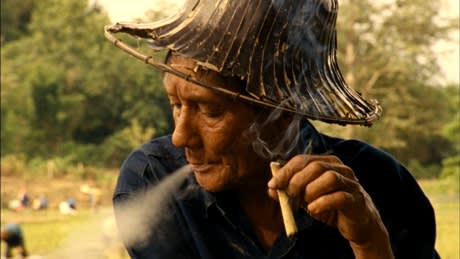In interpreting and appreciating Rirkrit Tiravanija's two-and-a-half-hour observational documentary, Lung Neaw Visits His Neighbours, it's important to acknowledge his gravitation towards Buddhist principles and the concept of ephemeralism and experience as a continual, ever-flowing amalgamate of seemingly insignificant moments. Often working extemporaneously, his previous dalliances with the film medium include an 8-hour loop of video titled, Lung Neaw, where the subject—who is similarly utilized in this work—does little other than experience the quotidian—picking his nose, getting dressed, sleeping...
Though insular, in the sense that it would appeal only to artists with a similar preoccupation or affected urbanites keen on using the film as a method of propping up their own performed social worth as mode of arbitrary (and ridiculous) superiority, this meditative work is ultimately successful in what it aims to do. As Lung Neaw literally wanders around and visits his neighbours, occasionally shopping, eating, picking plants, cutting wood or getting dressed, the sense of change and impermanence is evident.
Also apparent is the clashing of Eastern and Western perspectives, with conversations gravitating towards concepts of self-sustainment while attempting to live a simple village life when middlemen exploit their work for bigger commercial gain. Lung Neaw's discussions with neighbours about marriage, children and the lure of Western life detail an obvious political sensibility popular amidst global cinema, wherein grass roots idealism is juxtaposed with the horrors of social evolution and the nature of human greed.
And while interesting in concept and surely easily projected as a moving personal experience in Eastern principles, the actuality of Lung Neaw Visits His Neighbours is that it's rather indulgent, pretentious and boring. Perhaps there is beauty in watching the experiences of someone living a lifestyle that is slowly dying out, giving audiences around the world a patronizing lesson in perspective, but it's really akin to watching a live unsecured surveillance camera in any given locale.
Though it's great that Tiravanija has crafted a work that reiterates his guiding ideologue, it's unfortunate that he's made no effort to make it accessible to anyone that might learn from, or appreciate, his stance on the medium or life experience. Instead, only those already converted—or performing the role of enlightened (read: sanctimonious) urbanite—will have the patience to consider, or even care about, what Tiravanija is trying to say.
Lung Neaw Visits His Neighbours screens on Thursday, November 8th, 2012 at 8pm at the AGO Jackman Hall.
(Estudio de Produccion)Though insular, in the sense that it would appeal only to artists with a similar preoccupation or affected urbanites keen on using the film as a method of propping up their own performed social worth as mode of arbitrary (and ridiculous) superiority, this meditative work is ultimately successful in what it aims to do. As Lung Neaw literally wanders around and visits his neighbours, occasionally shopping, eating, picking plants, cutting wood or getting dressed, the sense of change and impermanence is evident.
Also apparent is the clashing of Eastern and Western perspectives, with conversations gravitating towards concepts of self-sustainment while attempting to live a simple village life when middlemen exploit their work for bigger commercial gain. Lung Neaw's discussions with neighbours about marriage, children and the lure of Western life detail an obvious political sensibility popular amidst global cinema, wherein grass roots idealism is juxtaposed with the horrors of social evolution and the nature of human greed.
And while interesting in concept and surely easily projected as a moving personal experience in Eastern principles, the actuality of Lung Neaw Visits His Neighbours is that it's rather indulgent, pretentious and boring. Perhaps there is beauty in watching the experiences of someone living a lifestyle that is slowly dying out, giving audiences around the world a patronizing lesson in perspective, but it's really akin to watching a live unsecured surveillance camera in any given locale.
Though it's great that Tiravanija has crafted a work that reiterates his guiding ideologue, it's unfortunate that he's made no effort to make it accessible to anyone that might learn from, or appreciate, his stance on the medium or life experience. Instead, only those already converted—or performing the role of enlightened (read: sanctimonious) urbanite—will have the patience to consider, or even care about, what Tiravanija is trying to say.
Lung Neaw Visits His Neighbours screens on Thursday, November 8th, 2012 at 8pm at the AGO Jackman Hall.
